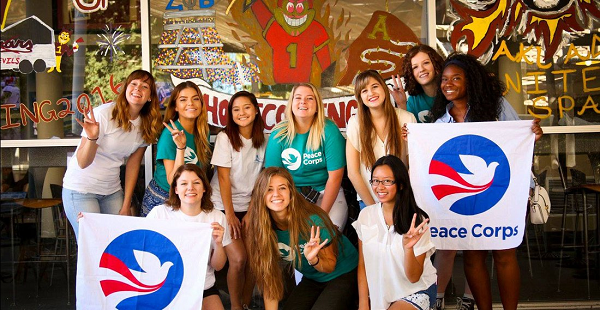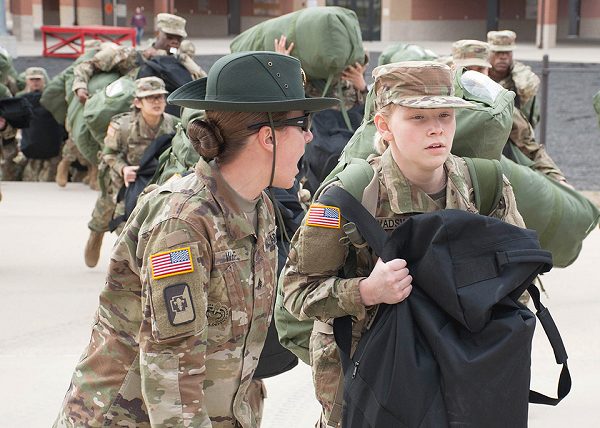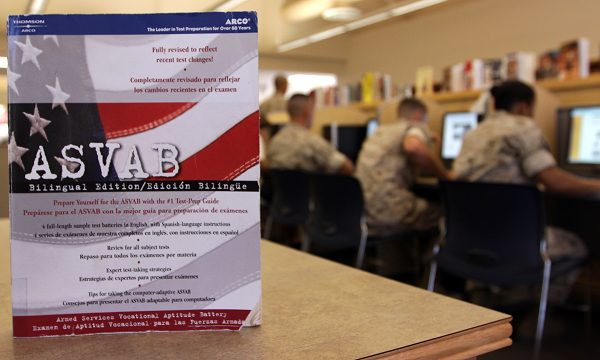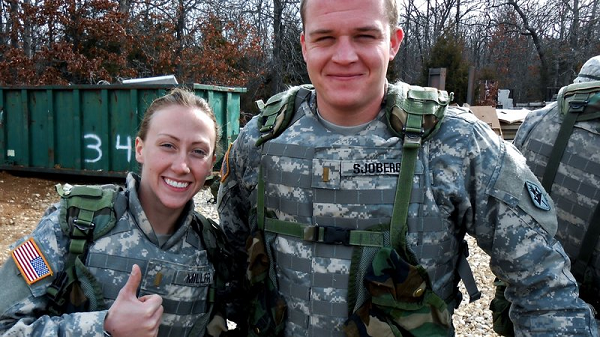military service is a valuable option for many potential recruits, but sometimes joining the military is not an option, and people find themselves searching for alternatives to the military.
Often the inability to serve is by no fault of your own, and other times it is the natural consequence of decisions.
However, hope is not lost. There are several alternatives to the military that get your life on a solid track and lead to many of the same fantastic outcomes the military offers.
Table of Contents
5 Alternatives to the Military
If military service is not in your future, you do have several fulfilling options to consider.
They include, but are not limited to:
#1. Four Year College
#2. Vocational Training / Community College
#3. Americorps
#4. Serving in the Peace Corps
#5. Other Volunteer Work
Learn more about each below.
#1. Four-Year College

You might consider applying to a four-year college rather than joining the military.
Although, many recruits sign up for military service to help pay for college.
However, there are many options available to help cover the cost of a four-year college program.
Take a look at where you are and look for a nearby state college.
State colleges are usually public and are less expensive than private colleges.
Also, when you look online at the cost of attendance, you are likely to see an astronomical price. Be aware those cost-of-attendance takes into account all expenses, even your daily cost of living.
You will see a different amount if you look at just the tuition and required fees for your preferred degree program.
For example, the in-state tuition for the University of Houston is about $16,000. per year This price seems impossible when deciding if you can afford college.
However, when you break down the cost with the tuition calculator, you find that the estimated cost for a full-time student is closer to $9,450 for one year for a resident of Texas. Your books will add more to that total, though.
Also, keep in mind that a Pell Grant has a maximum amount of $6,000 a year, covering a considerable amount of your tuition.
Therefore, be sure to fill out your Free Application for Federal Student Aid (FAFSA) to find out what aid you qualify for.
Of course, it is ideal if you live within driving distance of your college. If not, consider student loans to help with living costs on campus or closer to campus.
Lastly, look at grants available to specific institutions that grant free tuition to those who qualify based on financial need.
For instance, Texas State University has its Bobcat Promise for students with families with an adjusted gross income under $50,000. While programs such as this one do not cover books, it does cover all tuition and fees.
Many state colleges offer similar programs, as well.
Related Article – Top 15 Military Colleges In The US
#2. Vocational Training and Community College

A four-year college degree is not the only path to financial freedom.
In fact, there is a strong argument in support of vocational training that focuses on skills training to put a qualified and high-earning workforce into lucrative entry-level positions.
There are several popular jobs in the military that have civilian counterparts with similar training.
Also, the cost of Vocational Training and Community College is significantly less expensive than state or private four-year colleges.
A person can easily use just their Pell Grant to pay for this training if they qualify for the whole grant amount.
Police Officer
The training to become a police officer varies by state. However, you can expect training to be as little as 13 weeks.
However, it is essential to know that there is a hiring process including written tests, physical fitness tests, psychological and medical tests, and several interviews.
Furthermore, many community colleges offer two-year associate degrees in police work that help you get hired.
Also, the average salary for a police officer in the United States is $62,500 a year.
Mechanic
If your idea was to join the military and become a mechanic, it is vital to know most vocational schools in the United States include mechanical vocational degrees.
Typically, you can earn your certified degree in mechanics within two years.
Your earning potential varies by state, but you can expect to make around $48,000 a year on average.
Radiology Technician
If you want to be a Radiology Technician, you can earn your associate’s degree within two years.
In some cases, you can earn a certificate, but a two-year degree is more marketable.
The average pay in this field is around $65,000 a year.
Air Traffic Controller
If your military dreams included being an Air Traffic Controller, you are in luck even if you cannot join the military.
If you cannot join the service, you can still earn your associate’s degree to be an Air Traffic Controller.
The average pay in this position is about $94,000 a year.
There are several other positions to consider when looking at vocational training or community college.
For instance, Electricians, Heating and Air Conditioning Technicians, and Plumbers command considerable salaries.
Plus, you cannot outsource jobs with vocational training, so there is security in these positions.
Related Article – Joining The Military After College
#3. Americorps
For many, the goal of joining the military is to serve our country.
If you need alternatives to the military, the Americorps might be a good fit.
The Americorps is a civil society program with the support of the United States government,
This program links adults with public service works in communities.
Also, there are benefits to this program.
You receive hands-on training, learn professional skills, and meet people you may need for networking in the future.
Furthermore, your contract will include education awards to help you with student loans or to put toward future education.
Also, you receive modest pay for your volunteer work as well.
#4. Peace Corps

The Peace Corps is an independent volunteer program run by the U.S Government.
The Peace Corps’ goal is to serve the international economic and social needs of people and communities.
Volunteers must be at least 18 years old. Although most opportunities require volunteers to have a four-year degree, in some cases, job experience counts.
Benefits include a stipend to cover housing and other living expenses within the community you serve.
Also, at the end of service, volunteers receive money to transition back to their home life.
If you have student loans, it is worthwhile to consider a deferment or the Public Service Loan Forgiveness plan offered by lenders.
Lastly, upon completing your service, many universities offer discounted tuition and other benefits to those going on to graduate school.
#5. Other Volunteer Work
If a long-term volunteer commitment is not your style, there are several military volunteer opportunities within your community to consider.
For instance, the USO is a volunteer program that works to connect troops with their families.
There are USO locations all over, and they need volunteers to work with troops and their families.
Another of many volunteer opportunities is the Wounded Warrior Project. This program works to meet the emotional and physical needs of wounded soldiers.
You can assist the Wounded Warrior Project by volunteering, fundraising, or working with companies that donate to the program.
For details about these and several other community-based volunteer programs, click here.
Related Article – Does The National Guard Pay For College?
What Would Disqualify You from Military Service?

There are several reasons why a person might be ineligible to join the military. They include:
- Medical Disqualification
- Felony Convictions
- Age
- Failure To Meet Testing Requirements
Medical Disqualification
Note: Click Here to see a list of 20 medical conditions that can disqualify you from serving in the US military.
There are medical qualifications for the military, as well.
While it is always best to review potential medical issues with your recruiter, some medical disqualifiers stand out.
For instance, mental disorders such as depression, anxiety disorders, and other mental illnesses are potential disqualifiers for service.
Bipolar disorder is another disqualifier, as well.
There are eyesight issues that might be an issue when trying to enlist.
However, in most cases, as long as you can correct your vision, you can enlist.
Although, if you have a potential job in mind that has its own expectations for eyesight, you might find yourself unable to get into that position.
Also, medical issues such as scoliosis over 20 degrees is a disqualifier, as are some weight issues, Chron’s disease, and some heart conditions.
While some medical issues such as wearing braces and stopping ADHD meds may delay entry, you can still join.
However, your recruiter will guide you through those medical barriers.
Felonies
Note: Click Here to read our detailed article on the military policy for felonies.
It is possible issues with the police could bar you from joining the military.
However, not every mistake leads to disqualification.
For instance, misdemeanors do not lead to the inability to serve in the armed forces.
Some felony charges create obstacles to joining, but it is not a lost cause.
For instance, if you have a DUI / DWI / OWI charge, you might find that some will accept you as a recruit, but not all branches will.
Also, criminal charges as a minor may be overlooked.
It is worthwhile to talk to a recruiter from more than one branch to discuss your legal history.
Although, many felonies will automatically disqualify you because military branches look for recruits with good moral character.
If you have more than one charge, with at least one of them being a serious offense, you cannot join.
Several DUIs within a short period are also disqualifying.
Sex crimes, arson, drug trafficking, and manslaughter will ensure you cannot be in the military.
Age
While many recruits join the military right out of high school, that is not always the case.
You must be at least 17 to join any military branch.
However, there are upper age limits, as well.
If you have the Coast Guard on your list, you cannot be older than 42 years old.
The Space Force and Air Force will let you join as old as 39 years old.
And the Navy will let you join as old as 41 years old.
The Marine Corps’ upper age is 28, and the Army wants recruits no older than 35 years.
Age is one of the primary factors behind exploring alternatives to the military for most men and women.
Failure to Meet Testing Requirements

The Armed Forces Vocational Aptitude Battery (ASVAB) test is a necessary screening for all military branches.
There are 99 potential points on the ASVAB, and each military branch has a minimum expectation to become a recruit.
If you wish to join the Air Force, you must score at least 31 points on the AFQT.
The Army will also consider you as a recruit with a score of 31.
If you wish to be a Marine, you need a score of 31, while the Navy requires at least a 31 for a score.
Also, the Coast Guard expects a score of at least 36.
These minimum scores are just the beginning. If you wish to qualify for specific jobs or advance enlistment ranks, you must score higher.
Also, if you have a GED instead of a High School diploma, your ASVAB score must be higher, usually 50.
Related Article – Joining the Military at 30: Here’s How to Do It
Conclusion
There are many reasons why individuals are not a good fit for military service.
Sometimes there are medical disqualifications, a history of legal troubles, testing requirements, and even age.
However, there are several alternatives to the military to consider.
A four-year college degree is one option, as are the many well-paid vocational training fields.
Other considerations are the Americorps, the Peace Corps, and the multitude of other local volunteer opportunities in your community.
References:
- Ikon Pass Military Discount: Learn How To Save Big - January 31, 2025
- RTIC Military Discount: Find Out How To Save Big on Gear - January 30, 2025
- Traeger Military Discount: Learn How To Save Big on Smokers - January 28, 2025





